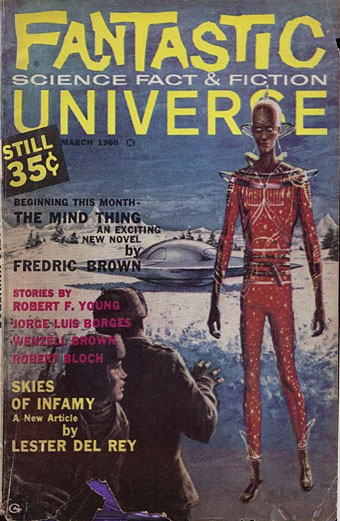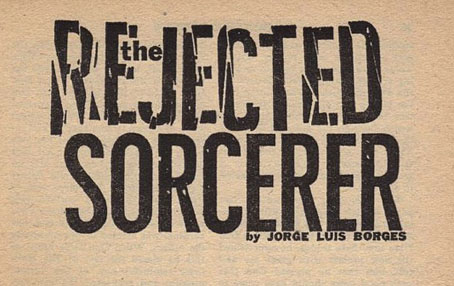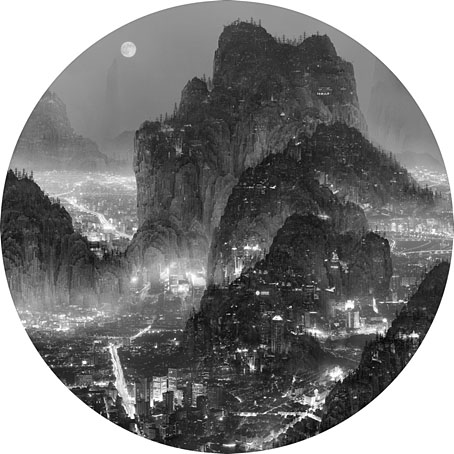
Cover art by Ed Emshwiller.
More Borges. While checking the details of yesterday’s post I discovered this oddity, an American SF magazine that published a two-page Borges story in March 1960, and put the author’s name on the cover even though few of the magazine’s readers would have heard of him at the time. The issue, which turned out to be the final one, lacks an editorial page so there’s no indication as to how the story found its way there. The story itself concerns an encounter in modern-day Spain between two men, one of them an established magician (in the occult sense), the other a neophyte hoping to gain similar powers. The piece is as much a moral fable as a work of fantasy, and as such appears out of place in a magazine with flying-saucer artwork on its exterior and a Virgil Finlay illustration inside (not for the Borges, unfortunately).

I thought at first that I might not have read this one before, the title wasn’t familiar but the story was one I recognised immediately. I was also surprised to find that I have it in four different collections under different titles, and with two of the printings appearing at first to disguise the author. In Black Water: An Anthology of Fantastic Literature (1983), edited by Alberto Manguel, the story appears as The Wizard Postponed, with the writer given as “Juan Manuel”; in The Book of Fantasy (1988), an updated version of the Antología de la Literatura Fantástica edited in 1940 by Borges, Adolfo Bioy Casares and Silvina Ocampo, the same piece appears as The Wizard Passed Over, with the author credited as “Don Juan Manuel”. The latter turns out to be the original author, a medieval Spanish writer, although “original” here is a debatable term when the story is Manuel’s adaptation of a piece he found in a book of Arabian tales. Borges rewrote this together with several other short reworkings which appear in the Etcetera section at the end of A Universal History of Infamy, its third appearance on my shelves (once again as The Wizard Postponed).
The fourth appearance is in the Collected Fictions (1998), or the cursed volume as I tend to think of it. I often feel bad about traducing the efforts of translator Andrew Hurley every time Borges is mentioned here but this story provides a good example of why his work is so unsatisfying to readers familiar with the stories from older editions. In its original Spanish the story is El brujo postergado, a short title for which The Wizard Postponed or The Wizard Passed Over would seem like reasonable analogues. Hurley expands this to The Wizard That Was Made to Wait, a lumbering, graceless phrase that’s typical of the lumbering gracelessness elsewhere in Collected Fictions. These tin-eared translations are the ones approved by the Borges estate so they’re present in all the reprints of the past 20 years. Fortunately for readers, most of Borges’ books were widely reprinted in English translations that the author approved, and some of which he even assisted with. Reject the conjurations of maladroit sorcerers, that’s my advice.
Previously on { feuilleton }
• The Immortal by Jorge Luis Borges
• Borges on Ulysses
• Borges in the firing line
• La Bibliothèque de Babel
• Borges and the cats
• Invasion, a film by Hugo Santiago
• Spiderweb, a film by Paul Miller
• The Library of Babel by Érik Desmazières
• Books Borges never wrote
• Borges and I
• Borges documentary
• Borges in Performance





